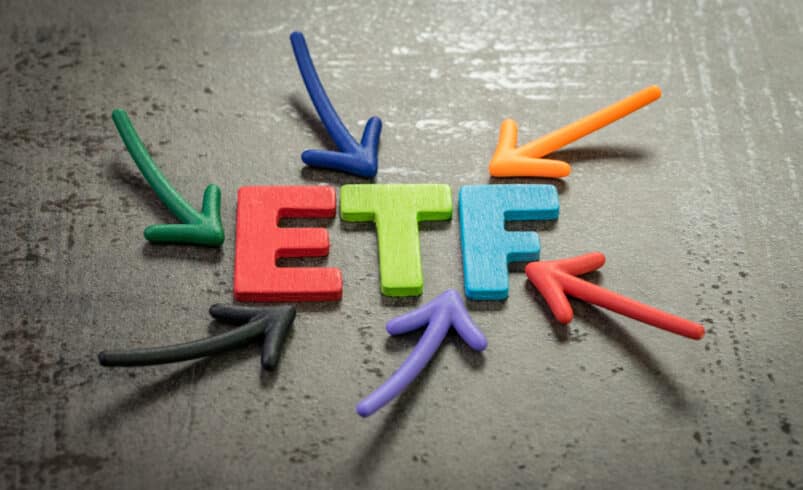What is a Bitcoin Spot ETF and How Does It Differ from Bitcoin Futures ETF?

What is an ETF?
An exchange-traded fund (ETF) tracks the value of predefined cryptocurrencies or assets. They are listed on traditional stock exchanges and are regulated investment vehicles. ETFs can contain a verity of assets such as stocks, commodities, or virtual currencies based on index.
An index is the criteria to measure the performance based on various criteria. S&P 500 is an example of stock index. All stocks added in this list completes the eligibility requirements of the given blockchain network.
In case the components of index are changed, ETF manager changes the holdings of the fund. However, ETFs does not calculate the net asset value or NAV at the end of each trading day like mutual funds.
ETFs are listed on traditional stock exchanges and traded like other stocks that subject them to price fluctuations based on supply and demand. Therefore, the NAV of ETF is calculated several times during a day. In this manner they offer greater liquidity and flexibility in comparison to mutual funds.
Investors can also mix ETFs with trading strategies such as long positions, short trading, and leveraged investing that is not possible with mutual funds.
What is a Bitcoin ETF?
Bitcoin ETF is a type of ETF that tracks the performance of Bitcoin or its derivatives. However, Bitcoin ETF is also regulated and listed on a traditional stock exchange. In recent times, two types of Bitcoin ETFs have gained popular demand among investors.
These Bitcoin ETFs are spot and futures that cater to different risk exposures and trading strategies.
What is Bitcoin Spot ETF?
A Bitcoin spot ETF is a type of exchange traded product that tracks the performance of Bitcoin in the spot markets. Therefore, the price of the Bitcoin spot ETF reflects the price of Bitcoin trading in real time. When the investors purchase the share of a Bitcoin spot ETF their portfolio represents the value of real BTC.
Pros and Cons of Bitcoin Spot ETFs
Pros
Here are some pros associated with Bitcoin spot ETFs mentioned as under:
Bitcoin spot ETF allow investors to invest in Bitcoin without directly purchasing the cryptocurrency. In this manner, they do not have to deal with security concerns such as digital wallets and private keys etc.
Bitcoin spot ETFs are regulated and listed on traditional stock exchanges therefore they bring legalization and legislative viability for virtual assets.
Bitcoin spot ETFs are suitable for traditional investors since they are familiar with the mechanics of stock market trading.
Cons
The value of a Bitcoin spot ETF is going to fluctuate in direct proportion with spot prices of BTC exposing it to higher price volatility.
Bitcoin spot ETFs may not track the price of Bitcoins in the spot market on account of administrative factors or trading fees.
Bitcoin spot ETFs bring virtual currencies into the purview of regulated trading instruments but the remaining altcoin market remains unpredictable.
ETF charge a hefty trading fee making them more costly to access in comparison to direct spot trading. The average cost of ETF can go as high as 2.5% compared with other virtual currencies.
What is Bitcoin Futures ETF?
Futures contracts are derivative contracts are legal agreement to purchase or sell an underlying asset at a predetermined rate on a specified period or date.
Bitcoin futures contracts are the derivatives that are used to purchase or sell BTC at a specified price before expiration. Bitcoin futures ETFs track the performance of Bitcoin futures contracts.
Bitcoin Spot ETF Vs Bitcoin Futures ETF: Key Differences
Differences between Bitcoin Spot and Bitcoin Futures ETFs are mentioned below:
Underlying Asset
Bitcoin Spot ETFs track the performance of real Bitcoins from the spot markets. On the other hand, Bitcoin futures ETFs track BTC futures contracts.
Performance Indicators
The price evaluation of spot ETFs is pegged to the rise and fall in the spot prices of Bitcoin. On the other hand, Bitcoin futures contract prices are based on futures market dynamics.
Liquidity
Bitcoin spot ETF issuers need to purchase and hold considerable amount of Bitcoin to retain higher value of the spot ETF. Investors can trade Bitcoin futures ETFs more frequently as they are subjected to expiration date that requires a complex liquidity management system.
Price Volatility
The value of Bitcoin spot ETF is pegged to the spot market prices of BTC. Meanwhile, Bitcoin futures contract prices can diverge considerably from the spot prices on account of expiration data and other metrics associated with futures trading.
Trading Risks
Bitcoin spot ETFs may incur higher price volatility that is derived from the spot markets. On the other hand, Bitcoin futures ETF prices are subjected to changes based on Bitcoin market value such as leverage and expiration dates.
Ease of Investing
Investors may need to invest in foundational infrastructure to store Bitcoins to maintain the value of Bitcoin spot ETFs. On the contrary, Bitcoin futures ETFs requires knowledge about the workings of the futures trading.
Conclusion
Bitcoin ETFs are often seen a bridge between the traditional and digital trading spaces. Bitcoin spot and futures ETFs bring unique benefits for the investors depending on their market exposure, trading goals, budget, trading methods, and skills.










